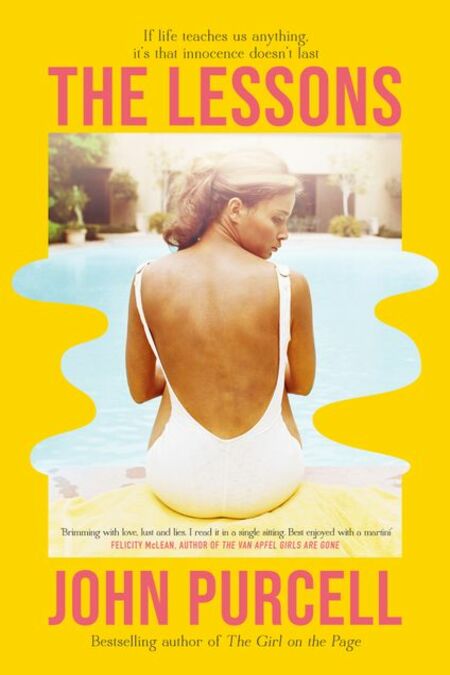Is there such a thing as a happy ending in real life?
We clearly to think so – how else do you explain the prevalence of romantic comedies and gushy love stories in just amount every storytelling medium there is?
But it’s that very ubiquity which fulsomely nods its longing head to the fact that we don’t often get the happy-ever-after we want and that real life, awash with poor decisions and wretched outcomes, is very short on the kinds of endings for which our dream romantic lives are renowned for.
John Purcell (The Girl on the Page) explores that chasmic gap between hope & expectation, and the grindingly disappointing truth of the human experience in his latest novel The Lessons which insightfully and confrontingly explores just how great the span between what we aim for with hopeful stars in our eyes and the truth of love and the way it’s often betrayed by our own hand.
Set in the sixties and the eighties, with the same characters moving between the decades, possibly wiser but likely still not that happy, The Lessons is a breathtakingly intense yet emotionally nuanced look at “love, betrayal – and literature” which pulls no punches when it comes to how badly we can let ourselves and others down and how little we can often do to redeem almost impossibly broken situations.
‘I have to go. I have to go. What time is it?’ She was staring out towards the west at the setting sun, where the low clouds were suppressing the sun’s attempts at a glorious send-off. ‘Oh. Oh.’
She kissed me briefly and clambered to the rim of the hollow.
‘Meet me here at two tomorrow?’
I nodded. Then she ran off.
I climbed to the rim and watcher her until she was out of sight.
Interestingly, Purcell rather bravely makes most, if not all, of the characters not that easy to like.
This is true of some more than others, with famous author Jane Curtis, a woman who moves from unhappy marriage to dissatisfying affairs and rather emptily in-between, someone who seems to leave wreckage behind her with little thought for how it affects others.
That’s not to say she doesn’t think about what she’s doing; she’s a fearsomely intelligent and insightful woman who knows precisely much of the time the havoc she will wreak in relationships close to her, whether it’s her niece Daisy, who moves in with her boho aunt at her mother’s request in a doomed attempt to straighten her out, or her boarder Simon, a rudderless rich boy who struggles to find a meaningful path in life and who, like many of the characters in The Lessons seems unable to draw away from the person to whom he was first dangerously and irredeemably attracted.
While it’s true that the characters in this powerfully illuminating novel aren’t that likeable, could that be because they are reflections on our own failures to realise our potential or to make good on the lofty dreams we hold in our youth, many of which, if not at all, fail to see the light of satisfying day?
Certainly many of the events that take place in the rarefied world of wealth, publishing and everyday life, however heightened, would suggest that while we set out with the best of intentions, that we often fail to realise the impelling power of first love, first dreams and nascent hope?
The Lessons would suggest that we are all too often unable to overcome the lesser angels of our nature.
Jane marries Sebastian, the university professor with whom she had an affair, surely compelled by some sense that she would realise some unspoken dream of romantic perfection, continually stumbles and falls when it comes to love and lust, aware she’s far less than the sum of her dreams, her disappointment distilled into her evocatively popular novels, but seemingly powerless, or caring enough, to do anything about it.
Similarly Daisy, who begins a forbidden affair with Harry, the son of a local farming family, who themselves are wretchedly broken and damaged and capable only of making life miserable for each other, clearly longs to being the heroine of her own romantic dreams but pushes aside what she knows to be true, such as her love for the rough but sweetly loyal Harry, seduced by some unknown need to pursue that which she cannot have.
She doesn’t know that at the time of course since she is young, and like all of us in our later teens, still in need of a great deal to learn, and so you can understand how it is that she makes mistake after mistake, or even when she doesn’t, how she fails to fully appreciate just how good she has it.
There is, it seems, something always glittering in the distance; alas, it’s only when she falls upon it that she realises it’s fool’s gold and by then it’s seemingly far too late to do anything about it.
“Audrey placed her hand on my shoulder, and said, ‘Daisy.’
I shook her off. She was sobbing. But I wasn’t ready to forgive her yet.
I screamed a third time, only realising Audrey was screaming with me when her cry outlasted my own.
Or is it?
That’s the million dollar question that percolates through The Lessons, whether it’s in Jane’s novels or Daisy or Simon’s or Harry’s ceaseless quests to find happiness where none seems to be found.
That may make The Lessons sound a like a bleakly dark novel to get through but in fact, it’s that optimism that this one decision or this particular moment that will fix things that makes The Lessons such an accessibly real novel to navigate, even with its trappings in upper middle class (for the most part), mid-to-late twentieth century life.
The fact that the optimism goes nowhere, and that it’s characters seem unable to act on the deep down sense of what they know to be right in life and live, doesn’t change the fact that, misguided or tragically flawed as they may be, that maybe they can still make a go of it.
You see this in the way that Daisy returns to Harry over and over again; she may not know what to do with her feelings but they are there, they are real and in his own emotionally inept, sometimes cruel way, she’s trying to make some sort of sense of them.
Quite whether any of them succeed is, of course, best left to the reading but suffice to say that The Lessons is one of those enthralling novels that shines a shocking light on us, and and which, while it’s suggesting, or simply outright saying that we too often fail to make good on the promise of our lives, that hope springs eternal, however butchered its expression might be, and that perhaps a happy ending, flawed though it might be, does await us?

